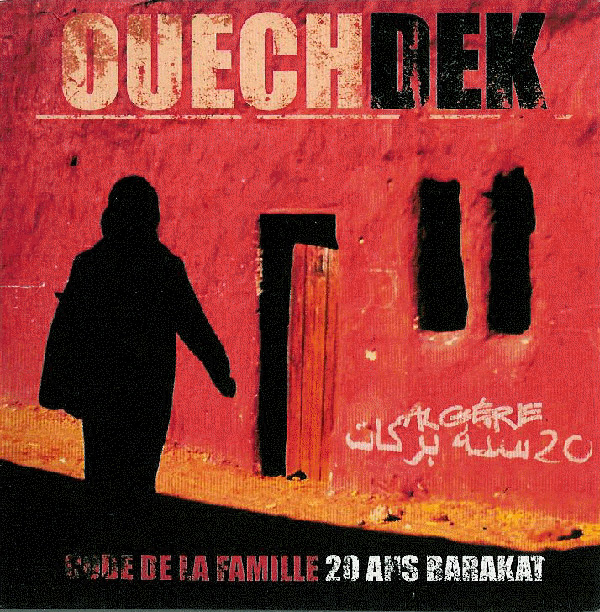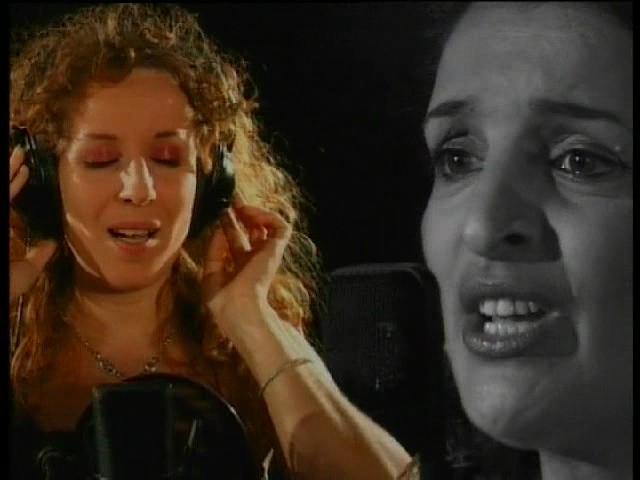Singing for Change
Women Musicians Unite to Overturn Algeria’s Family Code
In the summer of 2003, twenty female musicians from Algeria, France and Argentina gathered in a recording studio in Paris, France. Their mission: to overturn Algeria's Family Code -- a set of laws that, for over 20 years, has relegated women to second-class citizenship. Their instrument: a song.
On June 9, 1984, after two decades of debates and vehement opposition, members of the Algerian Parliament succeeded in passing the Family Code. The Code put legal provisions into place to regulate marriage and family relations in accordance with conservative interpretations of Islam. Under the Family Code, women cannot freely choose a husband without the consent of their guardians, usually their fathers. In marriage, women must obey their husbands. Women are less free to divorce. They receive smaller shares of inheritance, and they have no legal guardianship of their children.
Supporters have lauded the Code for upholding Islamic laws and ethics. Critics, including feminists and secularists, have argued that the law has institutionalized a second-class citizenship of women.
Women Declare "Twenty Years is Enough!"
2004 marked the twenty-year anniversary of the Family Code in Algeria. Determined to put an end to the systemic oppression of women brought on by these laws, a group of Algerian women formed the collective 20 ans, Barakat! (20 years is enough!) and produced a music video denouncing the code.
Twenty women from diverse backgrounds sang and recorded the song "Ouek dek yal qadi" (What came over you, judge?) proclaiming: "This law must be undone and never done again!" Distributed via radio, French television and the internet, the resulting music video, featured here, exemplifies women working creatively and collaboratively to rally the public to change Algerian politics.
In May 2008, in Marrakech, Morocco, I.M.O.W. sat down with the director of 20 ans, Barakat!, Caroline Brac de la Perrière, to discuss the organization and their motivation for producing a music video as a tool to repeal Algeria's Family Code.
How did 20 ans, Barakat! form?
In 2004 the Family Code would have been in place for twenty years! I have a daughter and I was thinking, "My daughter is going to know only the Family Code. It's not possible. I don't want that!" We really have had enough! So that's where the name "Barakat" [Enough!] comes from.
"Barakat" is also a reference to Algeria's Independence War [from 1954-1962.] At the end of the seven-year war against France, Algerians began fighting amongst themselves. In reaction to persistent violence, people went in the streets and said "Seven years Barakat!" We thought this name would stick in people's memory.
What motivated you to use music as a method for reform?
We really wanted young people to join us because we were all getting exhausted and, well, old. We thought, "Okay. Let's do a song!" But what kind of song?
Friends of "20 ans, Barakat!" were very close to some Algerian musicians and Algerians who had a broadcast on the radio. They were all very well known, and they had connections to all the musicians in Algeria, and they live abroad, in France, like us. So we were thinking "Okay. We should work with them." Even for them, it will be good. We can all do something!
Was it a lot of work to get all the artists together?
Yes. But this was one good thing that came from the diaspora because everybody was living in Paris. So we made the video in Paris. All the musicians we invited agreed to participate, and they did it for free. We also interviewed them about what their relationship was to the Family Code and of their own life as Algerian women singers.
We were very ambitious. We wanted young people to like it. We wanted a song that even an old woman can listen to in the kitchen by the radio. Since she likely won't leave the house, we wanted her to understand that the song and message is also intended for her.
We had to make it very Algerian with a really Algerian sound. But it also needed to be something you can dance to. And we wanted three Algerian languages -- Arabic, Berber and French -- to be heard in the video.
You seem to have included many different people as well as men. Why?
We wanted all Algerians to hear and recognize him or herself so that's why we invited a woman from the South of Algeria, a woman from the West, and the East. We took women from every origin. We tried to have well-known people also.
We wanted the song to resonate with migrants. So, in the clip, when you see women who are singing in French, they are migrant woman, and specifically, Algerian migrant woman. Although they don't know Arabic, they are Algerian and they are in the Family Code because those laws follow you everywhere you go.
We managed to get all professional singers to participate -- some are not very well known, and some are very well known. One of them is also in a soap opera on Algerian TV. Everybody loves her. So we were very happy that she wanted to participate.
We asked two international singers to come. In the clip, you can see Annie Flore Batchiellilys. She's the golden voice of Africa. And there is Barbara Luna who's from Argentina. She learned to say a sentence in Arabic so we cannot really tell that she comes from Argentina.
We wanted men involved, so that's why at the end of the video we open it up to men. In fact, we had asked some fifteen men to come and only four responded. They were not so supportive. But anyway, they are in the film. We wanted men to get involved because, while it was important for us to talk about the plight of women, we also wanted to say that this future is about all of us.
And where is the video shown?
We asked ourselves, "What TV channels do Algerian people watch?" We knew that they watched a lot of Al Jazeera, but at that time, even in 2004, they were watching all the French channels a lot. So we tried the French Channel, because we knew there was just one state channel in Algeria, and it's very censored.
So the video has been shown, especially on TV for immigrants in France. I have had several friends in Algeria who called to tell me "I have seen the clip!" So we knew that it was shown there. So that's good.
The song, itself, has played on the radio several times. Not enough for us. We really wanted it to be a hit, you know? This is our ambition. It's not finished yet.
Do you have any sense of what kind of impact the music video has had?
As a collective, we are too weak to follow what we are doing. I think that in the last two years since 2006, we have become a little bit stronger. But really, it's only the beginning. It is good to see all the young people in our organization. And it's not only women. It's young men! That means that at least one of our intended audiences is interested. If young people like it that means that we will be successful because if they want to make it known, they will succeed.
I should say that since our movement began, revisions were made to the Family Code, in 2005. We don't know and can't say for sure if our campaign contributed to the changes. Everyday there was an article about the Family Code in the Algerian press.
How has the Family Code changed, specifically?
The duty of a wife to obey her husband has been removed, and this is very big. When you don't have to obey your husband, you can do a lot of things. Divorced women now have guardianship rights and the right to custody of their children. For a widow, these things will change her life. They will change the life of women and, men.
The law on divorce has not been touched. It's still not egalitarian. There have been lots of changes actually, but none of them are very clear. But overall, we are happy with the changes. It means the Family Code can be changed and that some articles can be removed. Before, it was a taboo. It was very difficult. You could not talk about it. It's not a taboo topic anymore.
Visit http://20ansbarakat.free.fr/ for more information.



